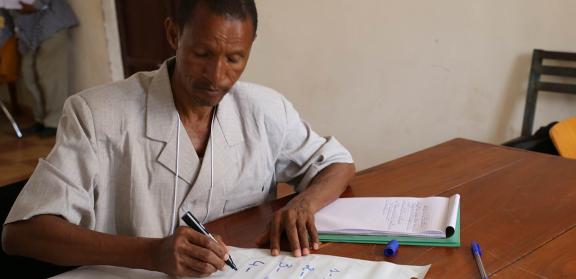
The project's Monitoring, Evaluation, and Learning (MEL) team is committed to improving the measurement of healthy diets, micronutrient status, and the burden of micronutrient deficiencies in global and local contexts. The team’s activities engage key stakeholders to strengthen targeting of resources and programs to the greatest needs by increasing the availability and quality of data. Through primary research and secondary analysis, the MEL team generates and disseminates evidence related to measuring hemoglobin and assessing anemia; measuring diet quality; and estimating the burden of micronutrient deficiencies.
Other key issues we support include improved measurement of the quality and coverage of IYCF services and monitoring and evaluation practices for programs that focus on adolescent nutrition and women’s diets. The team is also supporting the development of a guide for Social and Behavior Change program evaluations to collect better programming data, and supported a Nutrition and Health Systems team-led activity collecting formative research on community health volunteer counseling for nutrition- and pneumonia-related behaviors in Kenya.
USAID Advancing Nutrition also supports USAID Mission staff focused on nutrition investments and programs with guidance and tools for monitoring and evaluation.
Topics in Evidence Generation
During the COVID-19 pandemic, the MEL team has worked with country program teams to employ remote data collection methods that comply with local health and safety requirements, while continuing our work. The USAID Advancing Nutrition program in the Kyrgyz Republic pivoted its baseline survey to fully remote data collection within months of the beginning of the pandemic, using phone-based data collection.
With the Nutrition in Humanitarian Contexts team, the MEL team has supported implementing partners’ efforts to examine how agriculture programs and factors such as social support, mental health, and food security in humanitarian settings influence diet diversity. To read more about the project’s work in emergency situations, please visit the Nutrition in Humanitarian Contexts team page.
The MEL team has adapted survey protocols and instruments to support replicability, efficiency, and appropriateness for different research needs. We are currently supporting a dietary assessment in collaboration with the Tanzania Food and Nutrition Centre and UNICEF’s Improving Maternal and Adolescents Nutrition program. We are also conducting a study on Minimum Diet Diversity data collection methods, comparing the list-based versus recall methods for assessing children’s diets. Finally, we are supporting efforts to identify and validate measures to estimate food intake and nutrient adequacies using Household Consumption and Expenditure Survey data in Malawi and Tanzania. To read more about our diet quality measurement work, visit the dedicated diet quality measurement webpage.
The Early Childhood Development and MEL teams are working on implementation research to build evidence on ECD integration into the nutrition delivery system in Mozambique. About three-quarters of children in Mozambique are at risk of failing to meet their development potential due to undernutrition and extreme poverty. With the support of the USAID Center for Children in Adversity and in close collaboration with the USAID Mission in Mozambique, USAID Advancing Nutrition is supporting Transform Nutrition’s (TN) implementation of integrated community-based services for caregivers and children in the first 1,000 days.
This program will integrate responsive care and early learning into TN’s caregiver group manual, which currently covers nutrition and WASH. USAID Advancing Nutrition will bring strategic support, likely over multiple years, to expand existing ECD activities through close collaboration with the government and other stakeholders. The activity has two key objectives:
- Strengthen caregivers’ knowledge and provision of early stimulation and responsive care.
- Strengthen the enabling environment to institutionalize nurturing care for ECD within multi-sectoral nutrition programming.